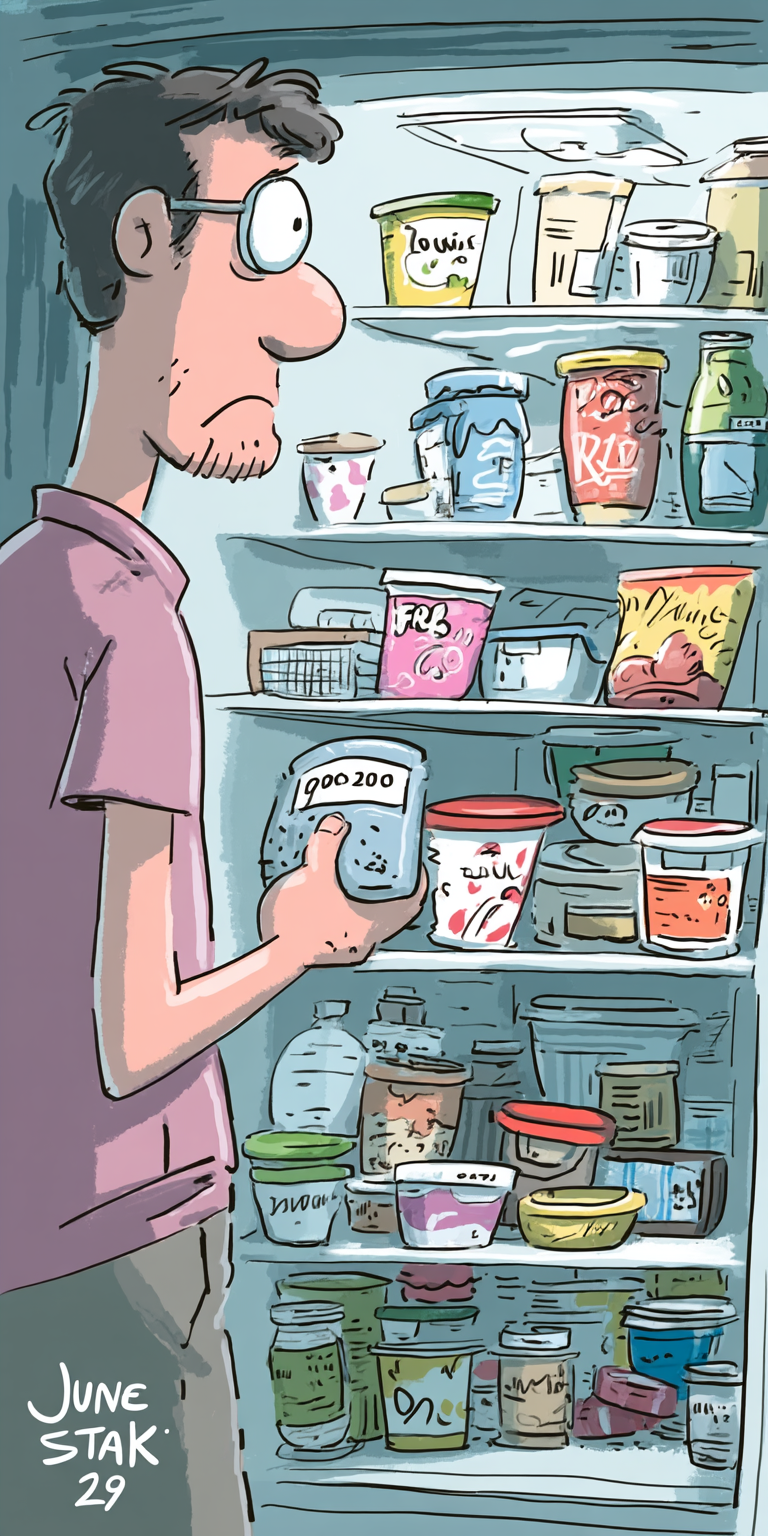FEATURE
The Truth About Expiration Dates Especially in summer heat
How to keep your cool (and your mayo from murdering you)
THE GREAT DATE DEBATE
You’re staring at a yogurt cup in your fridge. It says June 29. It’s July 1. You sniff it. It smells… fine-ish? Do you eat it and gamble with destiny, or toss it and mourn the 89 cents? Ah yes, the classic American pastime: playing refrigerator roulette.
Let’s be honest—expiration dates are confusing. “Best by,” “Sell by,” “Use by,” “Enjoy by,” “Freeze before,” “Wouldn’t recommend after”… it’s enough to make a person give up and live off toaster waffles.
But here’s the big secret: most expiration dates are suggestions, not commands. Yep. In many cases, they’re about quality, not safety. Food manufacturers slap them on to protect flavor, texture, or just cover their legal behinds. But throw summer heat into the mix, and suddenly your expired eggs might become a DIY biohazard.
So let’s break it all down—what expiration dates really mean, when to trust your nose, and what foods become risky little stink bombs when it’s hotter than the surface of the sun outside.
THE DATES DECODED
Not all labels are created equal. Here's your cheat sheet:
Sell By – For stores. Tells them when to rotate inventory. You can often eat it days (sometimes weeks) later.
Best By / Best If Used By – The suggested date for peak flavor. Doesn’t mean it’s unsafe after that.
Use By – The only one you should side-eye hard. This is more about safety—especially for perishable items.
Freeze By – Stick it in the freezer before this date if you want to keep it longer. Once frozen, the clock basically stops.
Foods That’ll Lie to Your Face in the Summer
Summer heat doesn’t just wilt your hydrangeas—it accelerates spoilage. Your car becomes a mobile crockpot. Your garage is a 100°F death trap. Your cooler is… mostly a puddle by hour four.
Let’s talk about foods that go bad real fast in warm conditions:
Mayonnaise and creamy salads – Potato salad can be a summer cookout MVP or a villainous gut grenade.
Milk & creamers – That gentle “thunk” when pouring is not the texture you want.
Deli meats – You’ve got a two-hour window at room temp. After that? You're rolling the dice.
Eggs – Safe in the fridge, but left out during brunch prep for hours? You might be better off eating the deviled egg dish.
Cheese – Hard cheeses hold up okay, but soft ones like brie or cottage cheese melt into dairy sadness quickly.
Hot tip: anything that says “keep refrigerated” should never be left in your car. Ever. Not even for “just five minutes.”
YOUR SUMMER SURVIVAL GUIDE
Let’s get practical. Here are your Organizer Man tips to avoid food poisoning while still living your best BBQ life.
🍉 1. Ice Packs Are Not Optional
Going to the beach? Bring a cooler with actual ice. Not “a cold soda can,” not “this was in the freezer earlier.” Ice. And lots of it.
🥪 2. When in Doubt, Throw It Out
Yes, it hurts to toss a $5 tub of hummus. But hospital bills cost more. If it smells funky, looks weird, or makes you tilt your head like a confused dog, don’t risk it.
🧃 3. Use a Sharpie
Label your leftovers with the date you made them. You’ll thank yourself in five days when you’re squinting at that mystery container.
🧊 4. Know the Two-Hour Rule
Perishables shouldn’t sit out for more than two hours. And in 90+ degree heat? That becomes one hour. Yes, even if Grandma’s tuna salad “never hurt anyone.”
🥚 5. Fridge = Below 40°F
Keep a thermometer in your fridge. Just because it’s humming doesn’t mean it’s cold enough. Summer is when fridges struggle the most—and lukewarm food can be dangerous food.
MYTHS, TRUTHS & FRIDGE SHENANIGAN
MYTH: “If it doesn’t smell bad, it’s safe.”
Nope. Some bacteria don’t announce themselves with stink.
Listeria and Salmonella are silent little ninjas.
TRUTH: Your pantry has villains, too.
Peanut butter, canned goods, and boxed snacks all have long shelf lives,
but even they can go rancid in hot garages or storage areas. Keep a cool, dry spot for them.
MYTH: “I freeze it, so it lasts forever.”
Technically, freezing does preserve food indefinitely, but quality starts to tank after a while. Freezer burn = sad dinners.
TRUTH: Some foods laugh at dates.
Honey – Immortal. Like Keith Richards.
White rice & dried beans – Basically, shelf-stable zombies. Still edible years later.
Hard cheese – Cut off moldy bits and carry on.
MYTH: "Expiration dates are federally regulated."
Nope. Except for infant formula, it’s the Wild West. Most dating is voluntary and set by manufacturers.
You’re not breaking any federal laws by eating that expired granola bar… just your own comfort zone.
Final Word: Chill Out (Literally)
Summer’s too short to spend it in the ER. Stay aware of what lives in your fridge, cooler, pantry, and backseat. Read the labels, but more importantly—trust your senses, your common sense, and maybe don’t eat that mayo sandwich you found under your car seat.
Remember: when the heat is high, the margin for error is low.
And hey—if you need help labeling leftovers, building a cooler system that actually works, or just want to laugh at my attempt to revive a container of Greek yogurt from 2021… you know where to find me.
Stay cool. Stay smart. And for the love of summer—respect the potato salad.
— Dan, The Organizer Man




